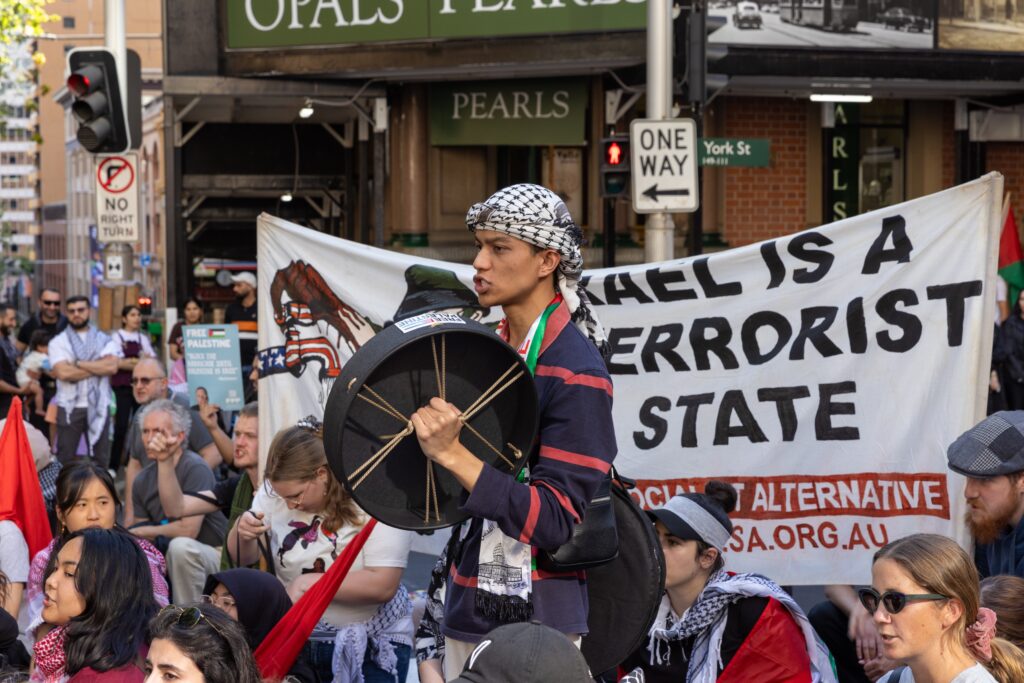Australia/Israel Review, Featured
Editorial: From crisis to crisis
Dec 16, 2024 | Colin Rubenstein

For the past half-century, the Australia/Israel Review (AIR) has been increasing the breadth of knowledge of Australians on a range of truly important issues, from foreign and domestic policy to matters of particular interest to Australian Jewry and, naturally, Israel, both alone and at the nexus of where these issues connect.
What began as a stand-alone periodical founded by the late Jewish community leaders Isador Magid and Bob Zablud, and edited by iconic Australian journalist Sam Lipski, in time became the flagship magazine of the broader Australia/Israel & Jewish Affairs Council (AIJAC). The accessible yet uniquely insightful content that the AIR strives to provide – whether written in-house by our policy analysts and researchers, or republished from other high-quality sources – forms the bedrock of AIJAC’s reputation. As such, the magazine has long been as much at home in the offices of legislators in our Federal Parliament and media personnel as in your mailbox in the suburbs.
Almost eerily, there are many parallels between the time when our publication was launched and the events surrounding its 50th anniversary today. Then, as now, Israel was finding its footing in the aftermath of defensive wars that were marked by catastrophic intelligence failures: the Yom Kippur War and the October 7 war, respectively.
Then, as now, the Australian government of the day had, in the eyes of many Australians, become demonstrably less supportive of Israel’s right to self-defence than it should have been, especially given the prevailing shocking circumstances – while also becoming less receptive to legitimate Jewish concerns within Australia.
However, the parallel breaks down with the level of domestic antisemitism that has accompanied the current political failure and lack of leadership. This hit fever pitch with the arson terror attack that destroyed Melbourne’s Adass Israel Synagogue on December 6.
The depths to which both Australia-Israel relations and the security of the Australian Jewish community have descended since the attack of October 7 are without precedent in Australian history.
To be clear, no mainstream Australian Jewish leader is saying the unprincipled debasement of our country’s diplomatic relationship with Israel under the Albanese Government is itself antisemitic. However, antisemitism has indisputably thrived under the cover of policies that effectively pander to those violently opposed to any Jewish right of self-determination.
The statistics paint a stark picture: antisemitic incidents in Australia have skyrocketed by 316% since October 7, 2023 – and that was even before the Melbourne arson attack and the further antisemitic vandalism, arson and intimidation in Sydney.
Jewish Australians feel abandoned and exposed.
Yet what is perhaps most disturbing is that the Jewish community is not surprised by the Adass Israel attack. The signs have been building for months: doxxing of Jewish creatives, hate-filled slogans at anti-Israel protests, Jewish students advised to study from home for their own safety and defaced war memorials. Police have repeatedly told Jewish Australians to stay away from public areas “for their own safety”.
Our political leaders have failed to effectively defend the values underpinning our multicultural society. Prime Minister Anthony Albanese’s strong condemnation of the Adass arson attack was welcome, as was his establishment of AFP Special Operation Avalite. But for many in the Jewish community, such statements seem belated and hollow. For more than a year, the Government failed to adequately address the wave of anti-Israel protests that have often turned intimidating and violent, even as its foreign policy decisions consistently exacerbated the problem.
Recent examples include the Government’s support for a biased United Nations resolution demanding Israel unilaterally withdraw from all of the West Bank and east Jerusalem without requiring any reciprocal actions from the Palestinians, including the cessation of terrorism. Foreign Minister Penny Wong’s remarks in a speech in Adelaide on Dec. 9 appearing to equate Israel with serial human rights violators Russia and China reflected a worrying moral relativism and obsession with alleged Israeli wrongdoing that erodes Australia’s credibility. And then there is the decision to deny a visitor’s visa to Ayelet Shaked, a former Israeli justice minister, on dubious grounds, after granting her one less than two years ago.
These positions embolden those who seek to delegitimise Israel and provide fodder for the antisemitic narratives poisoning our public discourse. Radical activists who have pushed the envelope into antisemitism feel the Government is changing its policies in response to their actions, and will seek to push even further.
Australian antisemitism is not just a Jewish problem. It represents a direct challenge to Australian multiculturalism and the cohesion of our democratic society.
Thus, the Government desperately needs to urgently recalibrate its approach to both domestic and foreign policy. It must crack down on antisemitic hate speech, incitement and violence and provide law enforcement agencies the resources and directives to act decisively against those who target Jewish Australians.
The Government should also return to the bipartisan foreign policy consensus that upheld Israel’s right to essential security. Supporting Israel’s self-defence against an existential threat is not just morally correct; it aligns with Australia’s strategic interests and our shared values. Furthermore, given the Palestinian rejectionism that has seen their leadership turning down repeated, genuine two-state peace offers, it is the only way to bring such an outcome closer.
Back in 2000, in the AIR’s 25th-anniversary issue, our late co-founder Isador Magid wrote about the genesis of the AIR in 1974, when then-Israeli Foreign Minister Yigal Allon told Magid that he wanted to see a Jewish magazine established in Melbourne to help encourage improved relations. Magid wrote, “The important point, on which Allon and I agreed, is that the publication should be genuinely independent, not simply a communal magazine, and that it should not be a mouthpiece of the Israeli government.”
While the magazine and the broader organisation it spawned, like Australia itself, has evolved over the past 50 years, the entire team at AIJAC is proud to live up to the values on which the AIR was founded in late 1974.
Being a trusted source of information forms the bond between our organisation, its supporters, journalists, political and student leaders and the Australian public.
And given the current unprecedented crisis, the need for the quality, fact-checked and timely information we provide to our hundreds of thousands of followers on social media platforms, on our website, in our FreshAIR email updates, and in the Review – promoting the shared interests between Australia, Israel and the Jewish world – has never been greater.






